Fundamentals of Signal Enhancement and
Array Signal Processing
�
Fundamentals of Signal Enhancement and
Array Signal Processing
Jacob Benesty
INRS, University of Quebec
Montreal, Canada
Israel Cohen
Technion, Israel Institute of Technology
Haifa, Israel
Jingdong Chen
Northwestern Polytechnical University
Xi’an, China
�
This edition first published
© John Wiley & Sons Singapore Pte. Ltd
All rights reserved. No part of this publication may be reproduced, stored in a retrieval system, or
transmitted, in any form or by any means, electronic, mechanical, photocopying, recording or otherwise,
except as permitted by law. Advice on how to obtain permission to reuse material from this title is available
at http://www.wiley.com/go/permissions.
The right of Jacob Benesty, Israel Cohen, and Jingdong Chen to be identified as the authors of this work has
been asserted in accordance with law.
Registered Offices
John Wiley & Sons, Inc., River Street, Hoboken, NJ , USA
John Wiley & Sons Singapore Pte. Ltd, Fusionopolis Walk, #- Solaris South Tower, Singapore
Editorial Office
The Atrium, Southern Gate, Chichester, West Sussex, PO SQ, UK
For details of our global editorial offices, customer services, and more information about Wiley products
visit us at www.wiley.com.
Wiley also publishes its books in a variety of electronic formats and by print-on-demand. Some content that
appears in standard print versions of this book may not be available in other formats.
Limit of Liability/Disclaimer of Warranty
While the publisher and authors have used their best efforts in preparing this work, they make no
representations or warranties with respect to the accuracy or completeness of the contents of this work and
specifically disclaim all warranties, including without limitation any implied warranties of merchantability
or fitness for a particular purpose. No warranty may be created or extended by sales representatives, written
sales materials or promotional statements for this work. The fact that an organization, website, or product is
referred to in this work as a citation and/or potential source of further information does not mean that the
publisher and authors endorse the information or services the organization, website, or product may
provide or recommendations it may make. This work is sold with the understanding that the publisher is not
engaged in rendering professional services. The advice and strategies contained herein may not be suitable
for your situation. You should consult with a specialist where appropriate. Further, readers should be aware
that websites listed in this work may have changed or disappeared between when this work was written and
when it is read. Neither the publisher nor authors shall be liable for any loss of profit or any other
commercial damages, including but not limited to special, incidental, consequential, or other damages.
Library of Congress Cataloging-in-Publication data applied for
Hardback ISBN:
Cover Design by Wiley
Cover Image: © naqiewei/Gettyimages
Set in /pt Warnock by SPi Global, Pondicherry, India
�
v
Contents
xi
Preface
About the Companion Website
xiii
1
.
..
..
..
..
.
.
.
.
Introduction
Signal Enhancement
Speech Enhancement and Noise Reduction
Underwater Acoustic Signal Enhancement
Signal Enhancement in Radar Systems
Signal Enhancement in Ultrasound Systems
Approaches to Signal Enhancement
Array Signal Processing
Organization of the Book
How to Use the Book
References
Part I Signal Enhancement
Single-channel Signal Enhancement in the Time Domain
Signal Model and Problem Formulation
Wiener Method
Linear Filtering
Performance Measures
2
.
.
..
..
.. Optimal Filters
Spectral Method
.
Joint Diagonalization and Reformulation of the Problem
..
.. Noise Reduction with Gains
..
.. Determination of the Gains from the Fullmode Output SNR
Performance Measures
Problems
References
3
.
.
Single-Channel Signal Enhancement in the Frequency Domain
Signal Model and Problem Formulation
Noise Reduction with Gains
�
vi
Contents
.
.
.
.
Performance Measures
Optimal Gains
Constraint Wiener Gains
Implementation with the Short-time Fourier Transform
Problems
References
Multichannel Signal Enhancement in the Time Domain
Signal Model and Problem Formulation
Conventional Method
Joint Diagonalization
Linear Filtering
Performance Measures
4
.
.
..
..
..
.. Optimal Filtering Matrices
.
..
..
..
..
.. Optimal Filters
.
..
.. Maximization of the Output SNR
.. Minimization of the Output SNR
Spectral Method
Temporal Joint Diagonalization and Reformulation of the Problem
Spatial Joint Diagonalization
Spatial Linear Filtering
Performance Measures
Case of a Rank Deficient Noise Correlation Matrix
Eigenvalue Decompositions
Problems
References
Multichannel Signal Enhancement in the Frequency Domain
Signal Model and Problem Formulation
Linear Filtering
Performance Measures
Input SNR
5
.
.
.
..
.. Output SNR
.. Noise Rejection and Desired Signal Cancellation
.. Desired Signal Distortion Index
.. MSE Criterion
.
Optimal Filters
.. Maximum SNR
.. Wiener
.. MVDR
.. Tradeoff
LCMV
..
.
Generalized Sidelobe Canceller Structure
A Signal Subspace Perspective
.
Joint Diagonalization
..
..
Estimation of the Desired Signal
�
Contents
vii
.
Implementation with the STFT
Problems
References
6
An Exhaustive Class of Linear Filters
.
Signal Model and Problem Formulation
.
Linear Filtering for Signal Enhancement
.
Performance Measures
.
Optimal Filters
.. Wiener
.. MVDR
.. Tradeoff
LCMV
..
.. Maximum SINR
.. Maximum SIR
.
Filling the Gap Between the Maximum SINR and Wiener Filters
Problems
References
Part II Array Signal Processing
Fixed Beamforming
Signal Model and Problem Formulation
Linear Array Model
Performance Measures
Spatial Aliasing
Fixed Beamformers
7
.
.
.
.
.
.. Delay and Sum
.. Maximum DF
..
Superdirective
..
Robust Superdirective
.. Null Steering
.
..
.. Compromising Between WNG and DF
A Signal Subspace Perspective
Joint Diagonalization
Problems
References
Adaptive Beamforming
Signal Model, Problem Formulation, and Array Model
Performance Measures
Adaptive Beamformers
8
.
.
.
.. Wiener
.. MVDR
..
.. Maximum Array Gain
..
LCMV
Tradeoff
�
viii
Contents
SNR Estimation
DOA Estimation
A Spectral Coherence Perspective
.
.
.
.. Definitions
.. Derivation of Optimal Beamformers
Problems
References
Differential Beamforming
Signal Model, Problem Formulation, and Array Model
Beampatterns
Front-to-back Ratios
Array Gains
Examples of Theoretical Differential Beamformers
First-order Design
Principle
9
.
.
.
.
.
.
..
.. Design Examples
.
..
.. Design Examples
. Third-order Design
..
.. Design Examples
.
..
.. Design Examples
Problems
References
Principle
Second-order Design
Principle
Minimum-norm Beamformers
Principle
10
.
.
.
.
.
.
Beampattern Design
Beampatterns Revisited
Nonrobust Approach
Robust Approach
Frequency-invariant Beampattern Design
Least-squares Method
Joint Optimization
Problems
References
Beamforming in the Time Domain
Signal Model and Problem Formulation
Broadband Beamforming
Performance Measures
Fixed Beamformers
11
.
.
.
.
.. Delay and Sum
.. Maximum DF
.. Distortionless Maximum DF
�
Contents
ix
Adaptive Beamformers
.. Superdirective
.. Null Steering
.
.. Wiener
.. MVDR
.. Tradeoff
.. Maximum SNR
.. LCMV
.
..
.. Second Order
.. General Order
.. Hypercardioid
.. Supercardioid
Differential Beamformers
First Order
Problems
References
Index
�

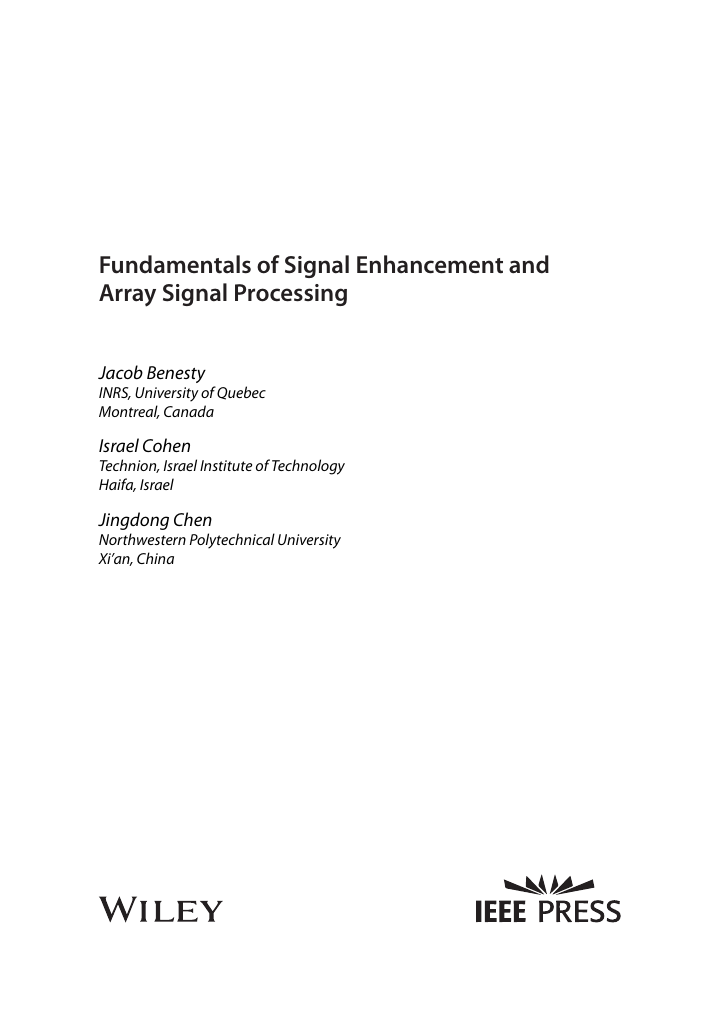

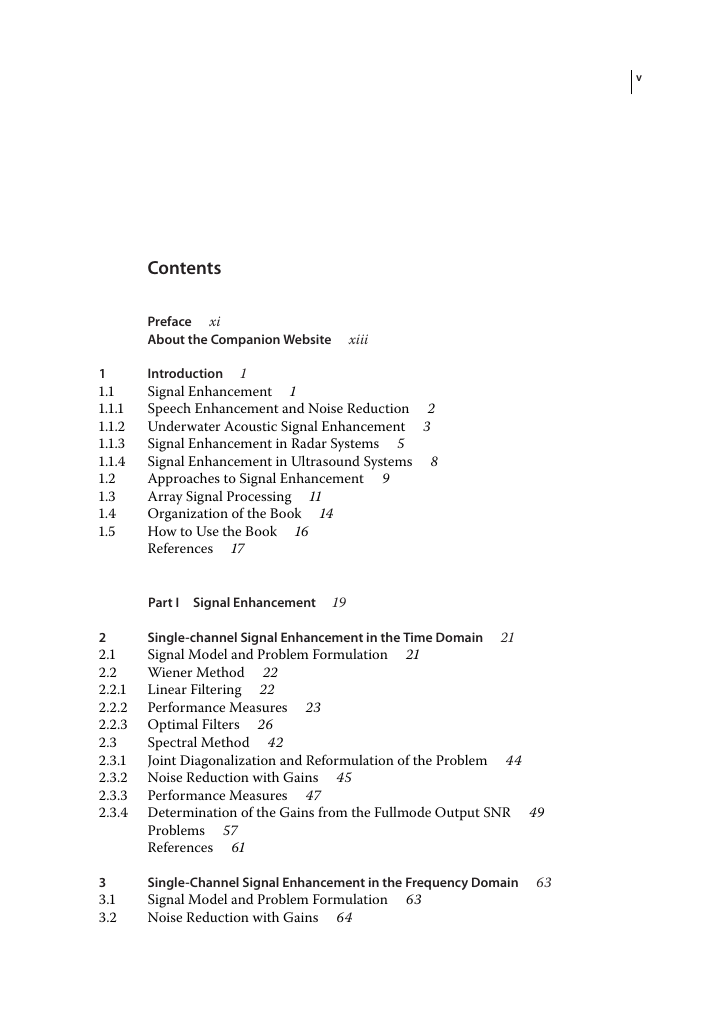
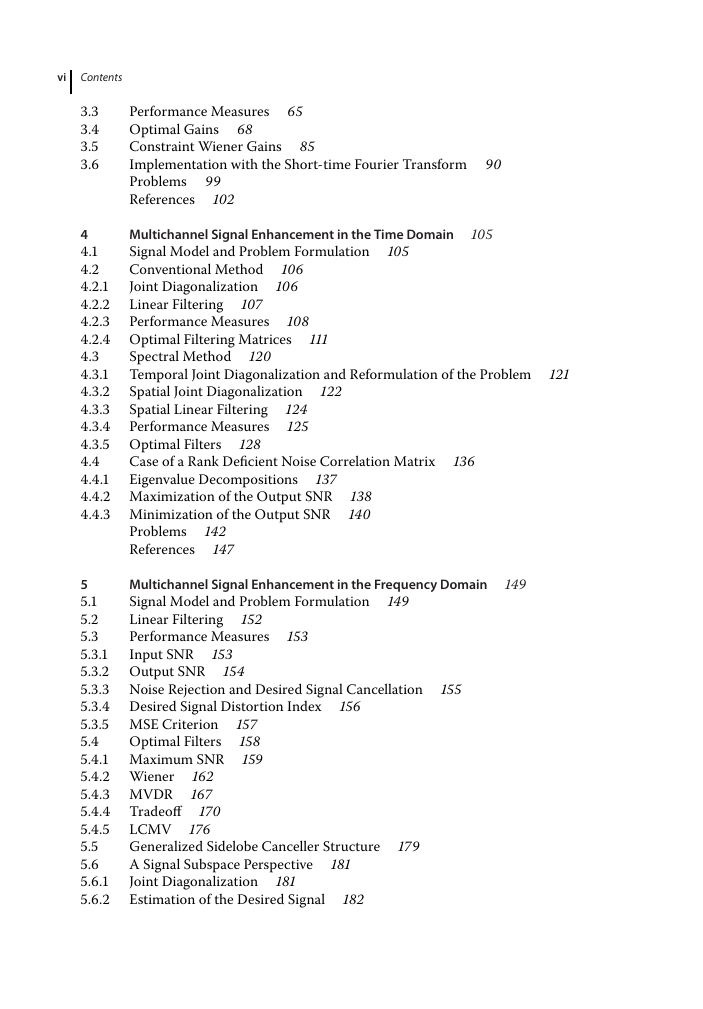
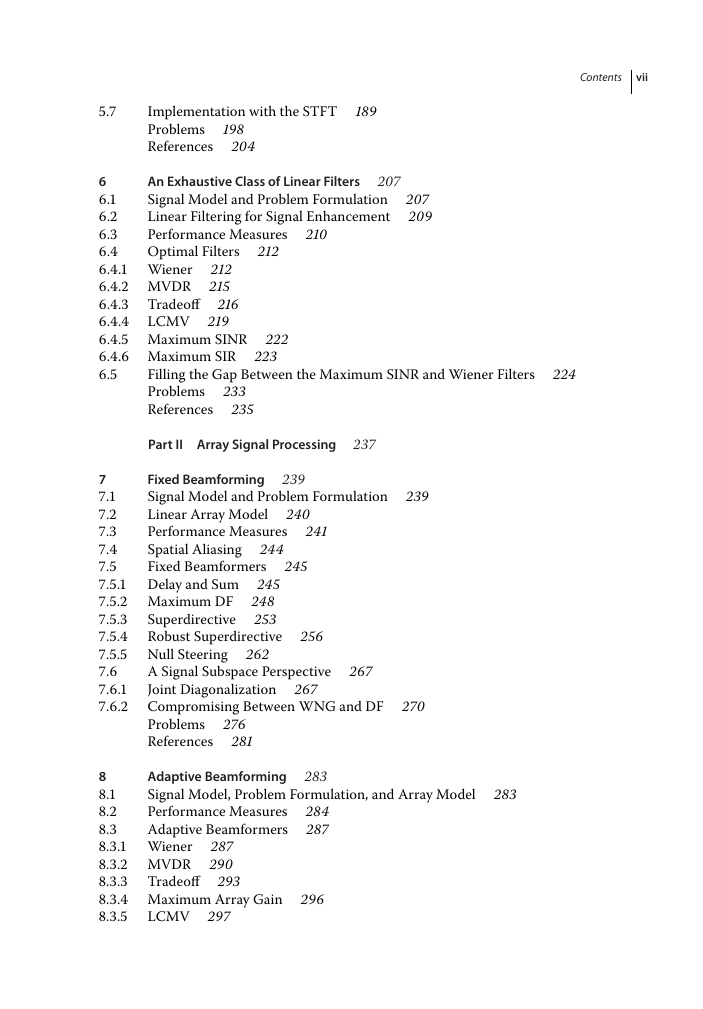
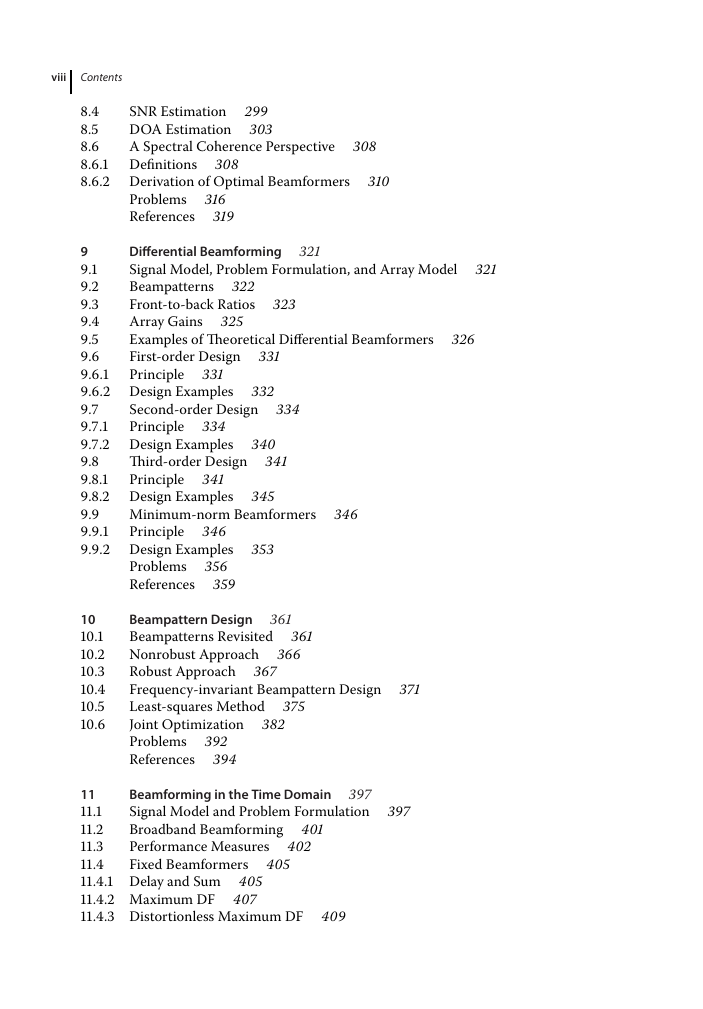
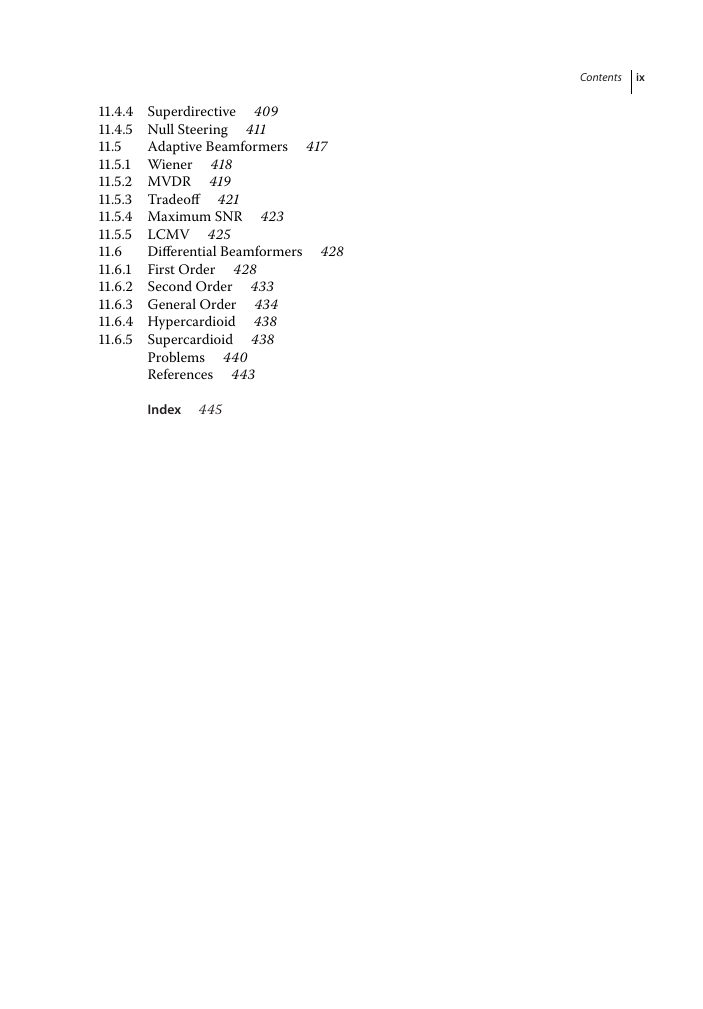








 2023年江西萍乡中考道德与法治真题及答案.doc
2023年江西萍乡中考道德与法治真题及答案.doc 2012年重庆南川中考生物真题及答案.doc
2012年重庆南川中考生物真题及答案.doc 2013年江西师范大学地理学综合及文艺理论基础考研真题.doc
2013年江西师范大学地理学综合及文艺理论基础考研真题.doc 2020年四川甘孜小升初语文真题及答案I卷.doc
2020年四川甘孜小升初语文真题及答案I卷.doc 2020年注册岩土工程师专业基础考试真题及答案.doc
2020年注册岩土工程师专业基础考试真题及答案.doc 2023-2024学年福建省厦门市九年级上学期数学月考试题及答案.doc
2023-2024学年福建省厦门市九年级上学期数学月考试题及答案.doc 2021-2022学年辽宁省沈阳市大东区九年级上学期语文期末试题及答案.doc
2021-2022学年辽宁省沈阳市大东区九年级上学期语文期末试题及答案.doc 2022-2023学年北京东城区初三第一学期物理期末试卷及答案.doc
2022-2023学年北京东城区初三第一学期物理期末试卷及答案.doc 2018上半年江西教师资格初中地理学科知识与教学能力真题及答案.doc
2018上半年江西教师资格初中地理学科知识与教学能力真题及答案.doc 2012年河北国家公务员申论考试真题及答案-省级.doc
2012年河北国家公务员申论考试真题及答案-省级.doc 2020-2021学年江苏省扬州市江都区邵樊片九年级上学期数学第一次质量检测试题及答案.doc
2020-2021学年江苏省扬州市江都区邵樊片九年级上学期数学第一次质量检测试题及答案.doc 2022下半年黑龙江教师资格证中学综合素质真题及答案.doc
2022下半年黑龙江教师资格证中学综合素质真题及答案.doc